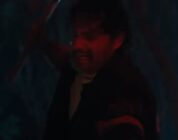Wichita’s Orpheum Theatre hosts a performance of George Romero’s classic zombie horror film “Dawn of the Dead” on Friday, April 26.
The screening is part of a 45th anniversary celebration of the classic picture spanning the months of April and May across screens in the U.S. and Canada (including drive-in showings).
Wichita filmmaker and film stalwart Leif Jonker has spearheaded local screenings of the film in the past, which proved both especially lucrative and entertaining, including a drive-in screening during the height of the COVID-19 pandemic. Jonker’s screening led to interest in booking the film in other markets, which ultimately led to him becoming the main distributor for the picture.
“I got to work with independent theaters,” Jonker said. “The chain theaters are nice, but you can’t put a button or T-shirt on an employee without corporate approval.
“Independents can do their own promotions, and they’re really excited about it. I had a guy from a drive-in in Florida sending me virtual hugs because he’d been trying to get the movie for 14 years, and he could finally show it.”
The present campaign sees “Dawn of the Dead” appearing at 106 theaters, including 12 in Canada.
Friday’s screening marks the film’s debut at the Orpheum.
Jonker recently spoke with KMUW about the history of the film, its influence on contemporary film and television, and the power of seeing it on the big screen.
This interview has been edited for clarity and length.
This is a landmark anniversary for “Dawn of the Dead.” Why do you think this film has endured?
It did redefine the zombie genre and pretty much everything we’re seeing zombie-wise now stems from “Dawn of the Dead.” “Night of the Living Dead” started the genre, it created it. Obviously, it changed horror. People started perceiving horror in a different way, putting it in more realistic settings and making it a lot scarier based on “Night.” “Dawn of the Dead” took a completely different tact. It was horror in broad daylight. It also had a lot of humor, and, of course, there’s the social commentary that George always infuses into his films.
Everything changed after it was released. It came out and suddenly [filmmakers in] Italy started making zombie movies. A lot of people started doing rip-offs around the world. Now, “The Walking Dead,” all the video games, “Dead Rising,” everything else goes directly back to “Dawn of the Dead.”
Why? Why are we still selling out screenings?
“Dawn of the Dead” is a little bit like “Jaws.” When “Jaws” first came out people were saying it was the scariest thing ever. The poster said, “From the terrifying best-seller.” “Jaws” plays uncut on TV now. It’s still suspenseful. It still can make you jump, but now it plays like a really intense adventure film. “Dawn of the Dead” now plays that way, too. When it came out, the gore effects in it? Nobody had seen anything like it.
I saw it when I was 12. I had to leave the theater for a second. My head was on fire. Now, even though it’s super gory, it plays like this really fun adventure. Part of the reason is that it has such strong characters. The four leads are so likeable and so relatable. I really believe the reason it’s persevering is because people love the characters and the story. It’s a really fun story. Taking over the mall and trying to survive the zombie apocalypse. Who wouldn’t want to do that?
[Laughs.] The film examines consumerism.
All you have to do today is look to Black Friday sales. George Romero was extremely prescient. There are scenes, news footage, I’ve seen of crowd pouring into Best Buy that could easily be cut into a zombie movie. He’s right. We, as Americans, are programmed to want something we don’t even need.
When I was a kid, I was a horror fanatic, but the movies often explored the classic monsters, Frankenstein’s monster, vampires, werewolves. Not a lot of zombies. How did zombies become dominant in films?
That’s something I got asked a long time ago on national television at a zombie jamboree. I kind of wandered around how it’s terrifying because a loved one — someone who just 20 minutes earlier, who you were fine with, maybe someone you’re married to or your kids — is suddenly zombified. It’s very intense. A very scary idea. I think that’s a big part of it. I think that’s a constant threat: People you love and know turning on you. It’s humanity turning on itself. But I don’t know. What do you think?
I think there’s a couple of things. One of which is the idea of turning on your neighbor. You think about AIDS, you think about the rise of awareness about dementia and now, of course, COVID adds a layer to things. That suspicion of each other. You would imagine that the [end of] the Cold War would have ushered in an end to some of that. But now, I think, it’s, “We used to be suspicious of those people over there, but now we have to be suspicious of each other.”
When some of these characters are bitten, there’s a slow progress. In “Dawn of the Dead,” there’s a character who dies a slow death. It’s a character that you love. It is a terror that we can all relate to, losing a loved one to disease. What’s interesting about George’s movie is that after a point, the zombies aren’t nearly as dangerous to your survival as the other living people. The conflict between the people is always the ferocious turning point where things really go bad because they can’t work together. They can’t get along. Eventually, they make themselves vulnerable to the zombies, who are just literally a force of nature. They’re like lions. If they eat you, they’re not being mean. They’re just doing lunch. The zombies are the same. The real scary part is man vs. man.
I love that we’ll get to see this at the Orpheum. I think that independent theatres have a chance to thrive right now. And I meet people all the time who tell me they’ve never seen a screening at the Orpheum.
The Orpheum shows a lot of great movies. The Orpheum has a great audience. They have 1,200 seats. Watching “Dawn of the Dead” on a big screen in a theater adds to the experience. [That’s true of] almost any movie. That’s always a different experience, no matter how many times you’ve seen it on video. Until you see it on a big screen, you really haven’t seen it. You see new details, it feels different. There’s the energy of the audience reacting. Even for people who aren’t super hardcore horror fans. If they can deal with “Walking Dead,” which is actually bloodier and gorier than “Dawn of the Dead” and that’s on TV, they can definitely deal with “Dawn of the Dead.” I think they’ll enjoy it.
You can watch it at home, but I think you really do have to see it on the big screen.
It’s an interesting thing. My dad was kind of an uptight guy. I convinced him to take me and my friends to the midnight movie for my birthday and we saw “Dawn of the Dead.” We all had a great time. We were laughing, and we came out of theater, and he said, “I think that movie’s made the best it could possibly be made. If you’re going to make that kind of movie.”
It was fake praise, but he said, “For what it was, it was good.” It wasn’t his cup of tea. Later on, I rented it on VHS. I brought it home, and we watched it, and he got upset about it. “We don’t need to be watching this.” He really wasn’t a big horror fan. Watching it at home made it more personal for him and somehow offended him, even though he had already enjoyed the movie in the theater. There is definitely a dynamic that happens when you’re sitting next to your fellow horror fans or movie buffs, watching a movie together, enjoying it together and experiencing it together. It cannot be duplicated.


